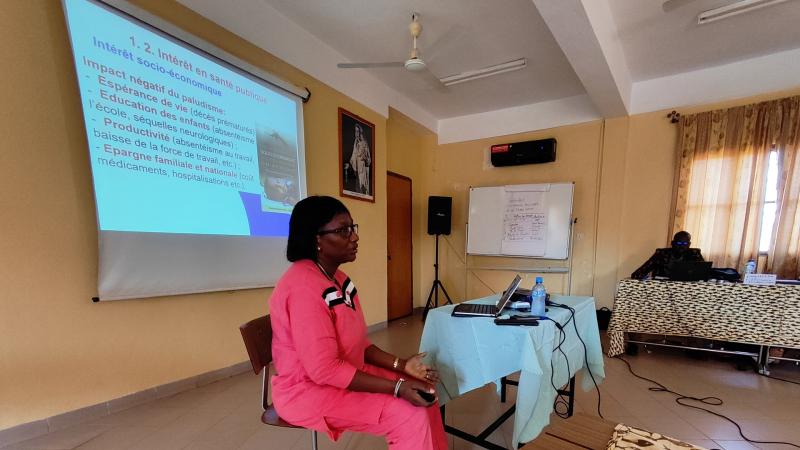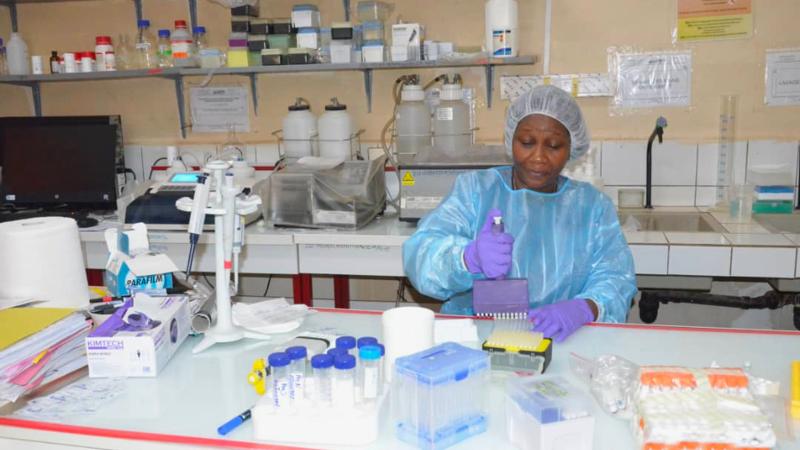TWAS has honoured a scientist dedicated to combating chronic pulmonary aspergillosis, a fungal disease that affects over 300,000 people each year. This disease poses a particular threat to those who have previously had tuberculosis (TB). Her innovative intervention has revolutionized the treatment approach for former TB patients with aspergillosis, who are frequently misdiagnosed and treated as if they had TB again.
Patients with pulmonary aspergillosis have shortness of breath, experience unexpected weight loss, and may cough up blood. Unfortunately, these symptoms mimic those of tuberculosis leading to misdiagnosis and, frequently, improper treatment.

Fungal infections are common in many African countries, including Burkina Faso. However, since the burden is often underestimated, these infections are not a priority at a national level. Parasitologist Sanata Bamba-Pakotogo is committed to reversing this trend. For improving the diagnostic and management procedures in treating the disease in a tuberculosis-endemic area of Burkina Faso, she has been awarded the 2023 TWAS-Abdool Karim Prize in Biological Sciences.
Established in 2017, the award is named after Quarraisha Abdool Karim, who today serves as TWAS President. It honours women scientists from UN-identified Least Developed Countries in Africa for their achievements in biological sciences. Bamba-Pakotogo, a professor of parasitology and mycology at the African and Malagasy Council for Higher Education, is the first Burkinabé to receive the award. She is also a member of the National Academy of Sciences, Arts and Letters of Burkina Faso.
"The TWAS-Abdool Karim Award has given me prestige and international visibility. Receiving this recognition is not only a personal honour, but also an honour for Burkina Faso," she said. "This award will attract the attention of national and international political, scientific, and financial decision-makers, and other development partners working for the health of populations in Burkina Faso. This will lead them to give priority to this health problem."
Bamba-Pakotogo has been working on chronic pulmonary aspergillosis (CPA) since 2017. She is currently the director of the Doctoral School of Health Sciences of the Nazi Boni University and head of the Laboratories Department of the Sanou Sourô University Hospital of Bobo-Dioulasso, Burkina Faso. Additionally, she is a prominent advocate alerting governments that CPA is often misdiagnosed as pulmonary tuberculosis and does not receive appropriate treatment. In recognition of her commitment to a world ‘free of fungal infections’, the Global Action for Fungal Infections has appointed Bamba-Pakotogo “ambassador” of Burkina Faso, serving as the country’s focal point for fungal diseases.
A better approach to diagnostic mistakes
CPA is an infection caused by fungi of the genus Aspergillus. These fungi reproduce through spores, which can be found both indoors and outdoors in soils, decaying vegetation, seeds, and grains, and are easily carried by the wind.
If they encounter a healthy person, they do no harm. But if someone has a weakened immune system, like a current or former patient with tuberculosis, they can settle in the lungs and colonize the pre-existing cavities dug by the TB bacterium (Mycobacterium tuberculosis). There, they form tangled masses called aspergillomas.

"Diagnosis of pulmonary fungal diseases, and CPA in particular, is a big challenge in Africa. Aspergillosis mimics pulmonary TB and most clinicians only assess the visible clinical symptoms, which are quite similar between the two infections," said Bamba-Pakotogo.
"Our approach has allowed us to recover one-third of former TB patients who would otherwise have been doomed to a 100% fatal outcome by mistakenly receiving only the antibiotics normally used against TB, instead of the appropriate antifungal treatment that is effective and efficient against APC," she added.
Most doctors, in fact, base their diagnosis only on the clinical appearance rather than on a microbiological test, therefore patients are most often treated for TB by default. Weight loss, chronic cough, fatigue and bloody sputum are observed both in pulmonary TB patients and in patients with CPA.
"To address the problem of diagnostic errors, we have established a Chronic Pulmonary Aspergillosis Diagnostic Unit, or CPADU, in our Medical Mycology Laboratory, at the Sourô Sanou University Hospital in Bobo-Dioulasso," she explained. CPADU is a clinical service that the scientist helped set up with the support of Professor Christophe Hennquin, of the Saint Antoine University Hospital in Paris, France.
Now, when a former TB patient is admitted to the hospital, clinical physicians ensure that the person has undergone proper treatment for the disease, excluding the possibility that it is resistant to anti-TB drugs. Once the situation has been clarified, the person is referred to CPADU.
Improving treatment of aspergillosis
Treatment of aspergillosis is another crucial issue, and better diagnoses lead to more accurate and cost-effective treatments, which not only save lives but also ease the workload of healthcare professionals.
The ideal approach for treating CPA would indeed be thoracic surgery, which is not easy to perform in Burkina Faso because of heavy costs and a lack of facilities. In addition, there is a common complication called hemoptysis, which involves blood coming out of the bronchial tubes through the mouth. The medications for this condition are prohibitively expensive in Burkina Faso, and most people there do not have health insurance.
"Against hemoptysis, we manage to offer medical treatment based on triazoles, drugs containing nitrogen. However, these drugs do not have marketing authorization in Burkina Faso, so they are imported at exorbitant costs," she said. Only 2% of patients can afford to pay for this drug.
This is why improving the diagnosis of chronic pulmonary aspergillosis is a decisive factor, because it contributes enormously to avoid administering the wrong drugs to people who received a wrong diagnosis. Treating a person for TB means giving antibiotics, which increases the number of bacteria that become resistant to anti-tuberculosis drugs in Burkina Faso.
Bamba-Pakotogo advocates for supporting TB-endemic countries by providing them rapid diagnostic tests for CPA. She calls on clinical and development partners, policy and financial decision-makers, the World Health Organization, pharmaceutical companies, and others to support her efforts. She aims to obtain backing for research projects, capacity building, and training on the topic, as well as funding for testing CPA and treatments for malaria, HIV, and TB in Africa.
CPA, Bamba-Pakotogo explains, should be considered in any former TB patient who has been well treated and returns to a health facility with signs of TB. "Chronic pulmonary aspergillosis is a silent killer," she said.
Cristina Serra

